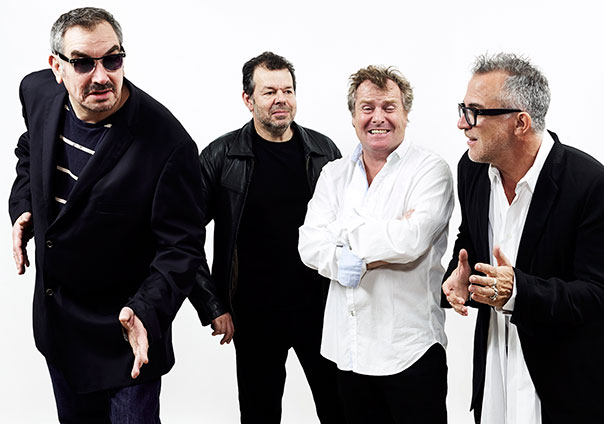Of all the iconic post-punk bands who have reformed in the last decade, the one least likely to do it well – to do it at all – were The Pop Group.
Formed in Bristol by boys so cool that they had embraced and rejected the Sex Pistols by the end of 1976 for being too rockist, they lasted just three years, two albums (plus a compilation of early demos), a few dozen legendary shows and three singles that defined that puzzling but eternally underrated sub-genre called punk-funk even more perfectly than the Gang Of Four or James Chance. While Mark Stewart (vocals), Gareth Sager (guitar), Dan Catsis (bass) and Bruce Smith (drums) have all spent the last 35 years or so making worthwhile music, nothing came close to the legend of The Pop Group, whose sloganeering, conspiracy-theory socialism, manic free-jazz unpredictability and ironic band name gained a hipster frisson for simply being too perfect to last.
So the reunion for live shows in 2010 couldn’t help but provoke cynicism, none of which was helped by the news that super-producer Paul Epworth (Adele, Coldplay, Florence And The Machine, etc) was manning the helm on a comeback album. Nevertheless, from the opening testifying crackle and post-hip hop strut of the opener and title track, its clear that Mark Stewart’s life-long mission statement for The Pop Group – “uplifting, abrasive funk with something more weird and interesting than ‘I wanna shag you all night long’ going on over it” – is present and correct. “Your mind has been wiped clean,” Stewart’s distorted voice wails as “Citizen Zombie” drizzles to a standstill, the perennial Stewart theme of irrational denial of the system’s violence and injustice firmly re-established.
So, having been reassured that Citizen Zombie is less money-spinning nostalgia and more rabble-rousing surprise, it fits that the following “Mad Truth” is an altogether more forgiving beast, a joyous early ‘80s disco throwback where, as Sager does his best choppy Nile Rodgers impression, Stewart concedes, “Its hard to make a stand.” From there, any vague possibility that Citizen Zombie will be as dissonant as original albums Y and For How Much Longer Do We Tolerate Mass Murder is banished by “Nowhere Girl”, a dubwise love ballad scorched by Sager’s as-close-to-rock-as-its-polite-to-get guitar.
But the most striking thing about Citizen Zombie is how young and naïve and happy it all sounds. The blissfully dancey “S.O.P.H.I.A.” is a case in point. Stewart still talks fondly of the Bristol scene that spawned The Pop Group, a tribe who spent 1975-77 enthusing about books, politics and the clothes and attitude of the Sex Pistols before going out to dance to soul and funk at the city’s multi-racial blues nights and discos. “S.O.P.H.I.A.” channels that teenage joy, the delight in being white bohemians who play disco ever so slightly wrong. And as always, Stewart is unashamedly, deliberately hilarious, crooning “You took me to the edge of the night” like a drunk at a bus stop before hitting the Situationist hook with relish: “Assume nothing!/Deny everything!”
The Pop Group have been given credit over the years for being original, subversive, prescient, clever, courageous… but rarely does anyone point out how funny they were. Epworth’s production – a perfect blend of 1979 surrealist angularity and 2015 machine-tooled gleam – emphasises and revels in this mischievous, celebratory side.
In other words, Citizen Zombie is The Pop Group album they were too at odds – with the world, with each other – to make 35 years ago. They were always inspired noise-mongers and sloganeers rather than great songwriters, and the likes of “Shadow Child”, “Box 9” and the obligatory anti-consumerist rant “Nations” probably won’t be making it into anyone’s Desert Island Discs. But Citizen Zombie has a coherence and warmth that only really surfaced, briefly and tantalisingly, first-time around, on the triptych of classic singles, “She Is Beyond Good And Evil”, “We Are All Prostitutes” and “Where There’s A Will”. In 2015, strangely, this makes The Pop Group finally sound like a pop group.
Q&A
Mark Stewart
Why did it take four years from the Pop Group live reunion in 2010 to releasing a new album?
“Me and Gareth had been writing the whole time while we got a five-year-plan together. Suddenly, out of the blue, I tweeted Paul Epworth because he’d been talking about us in an interview saying that we were a big influence. I asked him if he fancied doing anything with us and he came back in seconds and said it would be amazing. And the next week we were in the best studio in the world working on it. This was in September so it’s happening really, really fast… from four years to all engines go.”
What did Paul Epworth add to The Pop Group?
“He’s what they call in psychiatry an enabler. Paul had only just opened this studio and wanted us in to baptize it, and he was so excited about plugging all the machines in backwards… he was like a little tiny kid. We were allowed to play with the big boys’ toys… and cut their heads off.”
Your lyrics still demand revolution. You haven’t mellowed with age…
“Not at all. For me, it’s always about context. The fact that we’re using our own channels and distribution set-up means that at last we can do exactly what we wanna do. No censorship from outside capital. We’re more radical, to use an old word, than we ever were.”
INTERVIEW: GARRY MULHOLLAND



